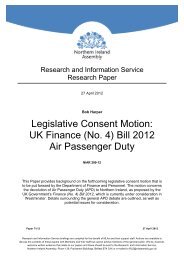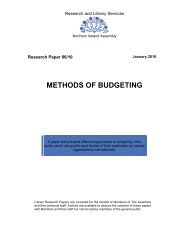Written Answers to Questions - Northern Ireland Assembly
Written Answers to Questions - Northern Ireland Assembly
Written Answers to Questions - Northern Ireland Assembly
Create successful ePaper yourself
Turn your PDF publications into a flip-book with our unique Google optimized e-Paper software.
Friday 20 July 2012 <strong>Written</strong> <strong>Answers</strong><br />
Passported Benefits<br />
Mr McCallister asked the Minister for Social Development for an update on (i) the consultative<br />
forum established <strong>to</strong> consider the issues of passported benefits; and (ii) the Social Security Advisory<br />
Committee established <strong>to</strong> carry out a review of the implications of a change <strong>to</strong> passported benefits.<br />
(AQW 13604/11-15)<br />
Mr McCausland:<br />
(i) The Universal Credit consultative forum provides the opportunity for senior officials <strong>to</strong> consider<br />
and advise on cross departmental policy issues arising from the introduction of Universal Credit.<br />
This includes reviewing potential eligibility criteria and the technical solutions required <strong>to</strong> deliver<br />
specific passported benefits.<br />
Via the consultative forum, my department has facilitated the analysis of potential costs and the<br />
impact on entitlement of identified demographics. This analysis will assist affected departments<br />
<strong>to</strong> determine the eligibility criteria that Ministers may choose <strong>to</strong> apply <strong>to</strong> the specific passported<br />
benefits for which they are responsible.<br />
(ii) The Social Security Advisory Committee was commissioned <strong>to</strong> complete a review of passported<br />
benefits in Great Britain and how they would interact with Universal Credit. At my request, this<br />
review was subsequently extended <strong>to</strong> include <strong>Northern</strong> <strong>Ireland</strong>. All departments that currently<br />
deliver passported benefits in <strong>Northern</strong> <strong>Ireland</strong>, and a number of cus<strong>to</strong>mer representative groups,<br />
responded <strong>to</strong> the consultation. A report detailing the Committee’s findings was published on 27<br />
March 2012.<br />
The report provided an analysis of current delivery across the UK and highlighted various<br />
methodologies that could be adopted for determining eligibility <strong>to</strong> the major passported benefits<br />
alongside the advantages and disadvantages of the detailed options. The report has been useful <strong>to</strong><br />
inform discussions on the eligibility and delivery of passported benefits in <strong>Northern</strong> <strong>Ireland</strong>.<br />
Universal Credit<br />
Mr McCallister asked the Minister for Social Development for his assessment of the projected<br />
additional uptake of benefits through Universal Credit, due <strong>to</strong> the simplifications which will be<br />
introduced <strong>to</strong> the rules governing the new benefit.<br />
(AQW 13605/11-15)<br />
Mr McCausland: It is estimated that up <strong>to</strong> 46,000* households will be newly taking up or taking up<br />
more benefit as a direct result of Universal Credit. This is due <strong>to</strong> changes in entitlement, increases in<br />
take-up, and the integrated nature of the Universal Credit system.<br />
This figure is made up of three main groups:<br />
■ Cases who were not entitled <strong>to</strong> current system benefits but are entitled and take up Universal<br />
Credit. For example in work, claimants aged under 25 who are not currently eligible for Working<br />
Tax Credits but will be eligible for Universal Credit.<br />
■ Cases who are entitled <strong>to</strong> current system benefits but do not take up any of their entitlement <strong>to</strong><br />
these benefits in the current system, who are then expected <strong>to</strong> claim Universal Credit when it is<br />
introduced, due <strong>to</strong> an increase in entitlement or a simpler claim process.<br />
■ Cases who take up less than their full entitlement <strong>to</strong> current system benefits, but will receive the<br />
full amount of Universal Credit they are entitled <strong>to</strong> due <strong>to</strong> the integrated system. For example, a<br />
claimant may be entitled <strong>to</strong> Income Support and Housing Benefit but only claim Income Support.<br />
Under Universal Credit, a claimant will be assessed for all the elements at one time and will<br />
au<strong>to</strong>matically receive the Housing Element if they are entitled <strong>to</strong> it.<br />
* Source of information: <strong>Northern</strong> <strong>Ireland</strong> version of the Department for Work and Pensions Policy Simulation<br />
Model.<br />
WA 630






